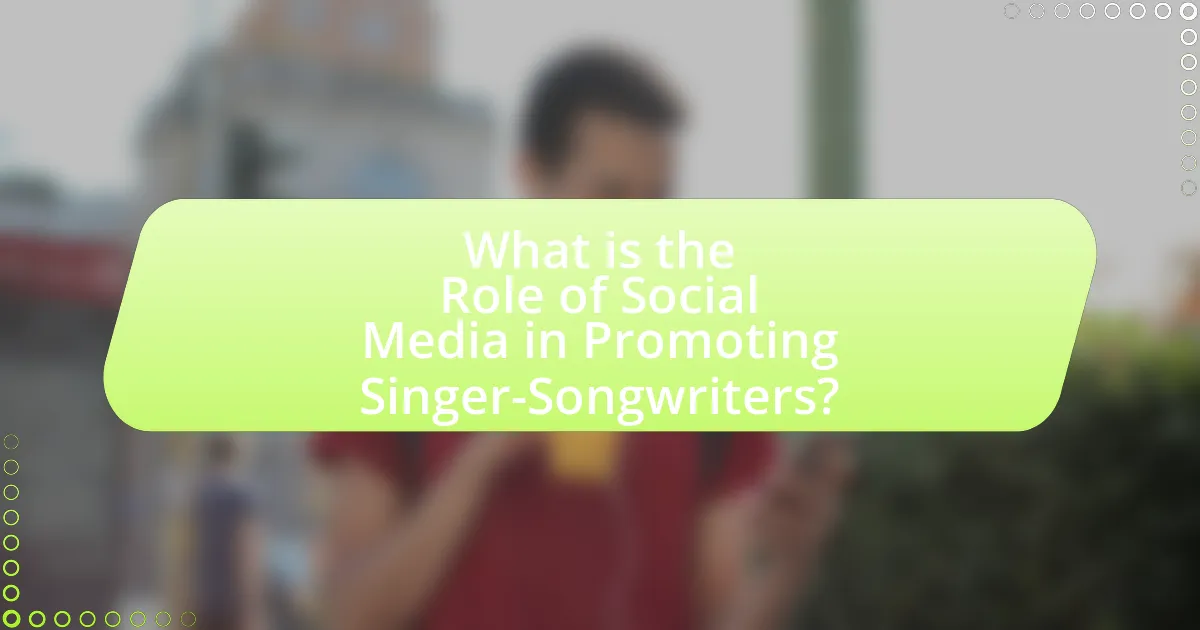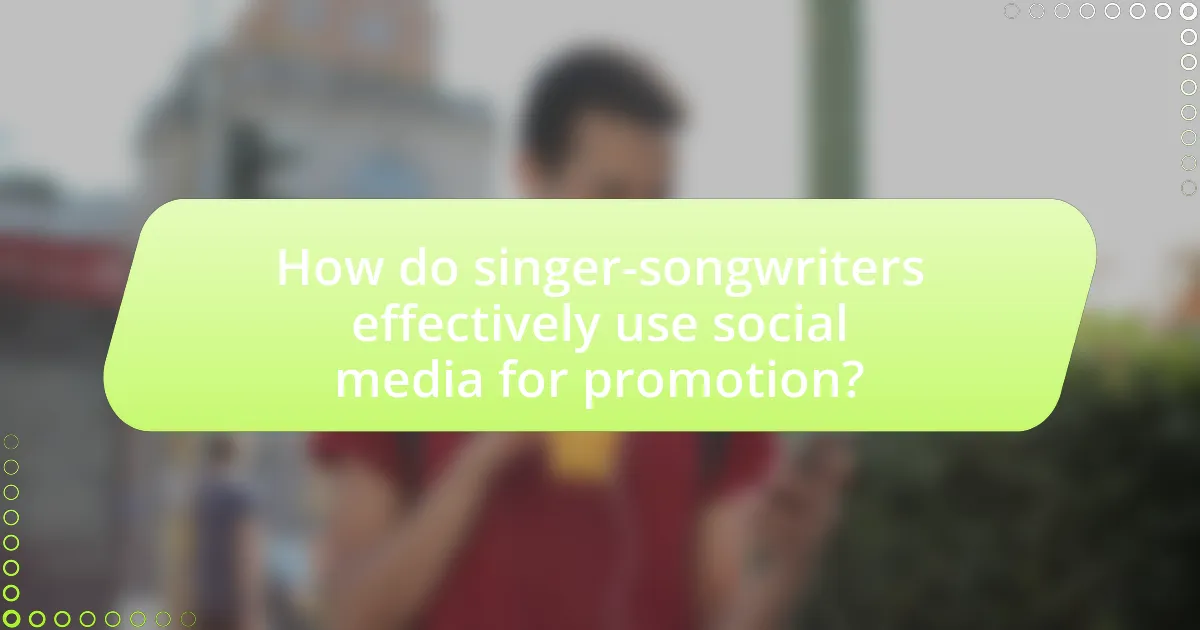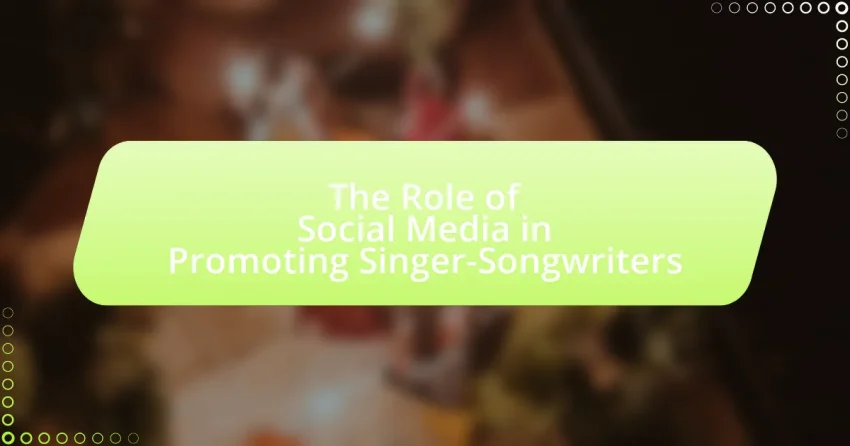The article examines the significant role of social media in promoting singer-songwriters, highlighting how platforms like Instagram, TikTok, and YouTube enable artists to share their music, engage with fans, and build their personal brands without traditional industry barriers. It discusses the transformation of the music landscape, emphasizing the effectiveness of social media for self-promotion and audience interaction. Key benefits such as increased visibility, direct engagement, and cost-effective marketing are outlined, along with strategies for content creation and audience engagement. The article also addresses challenges faced by artists, metrics for measuring success, and tools for managing social media presence, providing a comprehensive overview of how singer-songwriters can leverage social media for their careers.

What is the Role of Social Media in Promoting Singer-Songwriters?
Social media plays a crucial role in promoting singer-songwriters by providing them with platforms to share their music, engage with fans, and build their brand. These platforms, such as Instagram, TikTok, and Twitter, allow artists to reach a global audience without the need for traditional music industry gatekeepers. For instance, TikTok has been instrumental in launching songs to viral status, with tracks like “Old Town Road” by Lil Nas X gaining immense popularity through user-generated content. Additionally, social media enables singer-songwriters to interact directly with their audience, fostering a sense of community and loyalty that can translate into increased streaming and concert attendance. The accessibility and immediacy of social media empower emerging artists to showcase their talent and connect with listeners in ways that were previously unavailable.
How has social media changed the landscape for singer-songwriters?
Social media has transformed the landscape for singer-songwriters by providing them with direct access to audiences and enabling self-promotion without traditional gatekeepers. Platforms like Instagram, TikTok, and YouTube allow artists to share their music, engage with fans, and build a following independently. For instance, a study by the Berklee College of Music found that 70% of independent artists use social media as their primary marketing tool, highlighting its significance in reaching listeners. This shift has democratized the music industry, allowing diverse voices to emerge and gain recognition outside conventional record label systems.
What platforms are most effective for singer-songwriters?
The most effective platforms for singer-songwriters are Spotify, YouTube, and Instagram. Spotify allows artists to reach a global audience through streaming, with over 400 million users, making it a key platform for music discovery. YouTube serves as a visual platform where singer-songwriters can showcase their performances and connect with fans, boasting over 2 billion monthly active users. Instagram provides a space for personal branding and engagement, with 67% of users discovering new music through the platform. These platforms collectively enhance visibility and audience engagement for singer-songwriters.
How do singer-songwriters utilize social media for promotion?
Singer-songwriters utilize social media for promotion by engaging directly with their audience, sharing content, and building their brand. They create and post music videos, behind-the-scenes footage, and personal stories to connect emotionally with fans. Platforms like Instagram, TikTok, and Twitter allow them to reach a wider audience, with TikTok alone generating over 1 billion monthly active users, providing significant exposure opportunities. Additionally, singer-songwriters often collaborate with influencers and participate in viral challenges to enhance visibility. This strategic use of social media not only promotes their music but also fosters a loyal fanbase, as evidenced by numerous artists who have gained mainstream success through viral social media campaigns.
What are the key benefits of social media for singer-songwriters?
Social media provides singer-songwriters with essential benefits such as increased visibility, direct audience engagement, and cost-effective marketing. Increased visibility allows singer-songwriters to reach a global audience, as platforms like Instagram and TikTok enable them to share their music and connect with fans beyond geographical limitations. Direct audience engagement fosters a sense of community, allowing artists to interact with listeners through comments, live sessions, and personal messages, which can enhance fan loyalty. Cost-effective marketing is another significant advantage, as social media platforms offer tools for targeted advertising and organic reach without the high costs associated with traditional marketing methods. These benefits collectively empower singer-songwriters to build their brand, promote their music, and cultivate a dedicated fanbase.
How does social media enhance audience engagement for singer-songwriters?
Social media enhances audience engagement for singer-songwriters by providing direct communication channels and interactive platforms. These platforms allow artists to share their music, behind-the-scenes content, and personal stories, fostering a sense of connection with their audience. For instance, a study by the Pew Research Center found that 72% of adults use social media, which enables singer-songwriters to reach a broad audience and engage with fans in real-time through comments, likes, and shares. This interaction not only increases visibility but also builds a loyal fan base, as artists can respond to feedback and create a community around their music.
What role does social media play in building a personal brand for singer-songwriters?
Social media is crucial for singer-songwriters in building their personal brand by providing a platform for direct engagement with fans and showcasing their music. This engagement fosters a sense of community and loyalty, which is essential for brand development. According to a 2021 survey by the International Federation of the Phonographic Industry, 80% of music consumers discover new artists through social media platforms, highlighting the effectiveness of these channels in reaching potential listeners. Additionally, singer-songwriters can utilize tools like Instagram and TikTok to share behind-the-scenes content, live performances, and personal stories, further enhancing their brand identity and relatability.

How do singer-songwriters effectively use social media for promotion?
Singer-songwriters effectively use social media for promotion by engaging directly with their audience, sharing authentic content, and leveraging targeted advertising. Engaging with fans through live streams, Q&A sessions, and personal stories fosters a sense of community and loyalty. Sharing behind-the-scenes content, songwriting processes, and personal experiences creates authenticity that resonates with followers. Additionally, targeted advertising on platforms like Facebook and Instagram allows singer-songwriters to reach specific demographics, increasing their visibility and attracting new listeners. According to a 2021 study by the Pew Research Center, 72% of adults use social media, making it a crucial tool for artists to connect with a broad audience.
What strategies can singer-songwriters implement on social media?
Singer-songwriters can implement several effective strategies on social media to enhance their visibility and engagement. First, they should create and share authentic content that showcases their music, songwriting process, and personal stories, as this fosters a deeper connection with their audience. For instance, posting behind-the-scenes videos or live performances can humanize the artist and attract followers.
Additionally, engaging with fans through comments, direct messages, and interactive content like polls or Q&A sessions can build a loyal community. Research indicates that artists who actively interact with their audience see a 30% increase in fan engagement, which can lead to higher streaming numbers and ticket sales.
Moreover, collaborating with other artists or influencers can expand their reach. A study by the Berklee College of Music found that collaborations can increase an artist’s follower count by up to 50% within a few weeks.
Lastly, utilizing targeted advertising on platforms like Instagram and Facebook can help singer-songwriters reach specific demographics, ensuring their music is heard by potential fans who are likely to resonate with their style.
How can singer-songwriters create compelling content for their audience?
Singer-songwriters can create compelling content for their audience by leveraging storytelling, authenticity, and engagement through social media platforms. Storytelling allows them to connect emotionally with listeners, as personal narratives behind songs can resonate deeply; for instance, artists like Taylor Swift often share the stories behind their lyrics, enhancing audience connection. Authenticity is crucial, as audiences are drawn to genuine expressions of creativity; research indicates that 86% of consumers value authenticity in brands, which translates to artists as well. Engagement through interactive content, such as live Q&A sessions or behind-the-scenes glimpses, fosters a sense of community and loyalty among fans, as seen with artists like Ed Sheeran who actively interact with followers on platforms like Instagram and Twitter.
What are the best practices for interacting with fans on social media?
The best practices for interacting with fans on social media include responding promptly to comments, engaging in meaningful conversations, and sharing user-generated content. These actions foster a sense of community and loyalty among fans. For instance, a study by Sprout Social found that 70% of consumers feel more connected to brands when their comments are acknowledged. Additionally, using personalized messages and addressing fans by name can enhance engagement, as personalized interactions are shown to increase customer satisfaction and retention. Regularly posting behind-the-scenes content and updates also keeps fans invested in the artist’s journey, further solidifying their connection.
What challenges do singer-songwriters face on social media?
Singer-songwriters face several challenges on social media, including oversaturation, algorithm changes, and audience engagement. The oversaturation of content makes it difficult for individual artists to stand out, as millions of posts compete for attention daily. Additionally, frequent changes in social media algorithms can limit the visibility of their posts, making it harder for them to reach their target audience. Furthermore, engaging with followers consistently is crucial, yet many singer-songwriters struggle to maintain meaningful interactions due to time constraints and the demands of their craft. These challenges hinder their ability to effectively promote their music and connect with fans.
How can singer-songwriters overcome negative feedback on social media?
Singer-songwriters can overcome negative feedback on social media by focusing on constructive criticism and engaging positively with their audience. By identifying specific points in the feedback that can be improved, they can enhance their craft and demonstrate growth. Engaging with fans through responses or live sessions can also foster a supportive community, turning negativity into opportunities for dialogue. Research indicates that artists who actively engage with their audience can increase their fan loyalty and mitigate the impact of negative comments, as seen in studies on social media engagement and artist reputation management.
What are the risks of relying too heavily on social media for promotion?
Relying too heavily on social media for promotion poses several risks, including diminished audience engagement, potential algorithm changes, and brand reputation issues. Diminished audience engagement occurs when followers become desensitized to content, leading to decreased interaction rates; for instance, a study by HubSpot found that engagement rates on social media have been declining, with organic reach dropping significantly over the years. Potential algorithm changes can drastically affect visibility, as platforms like Facebook and Instagram frequently update their algorithms, which can limit the reach of promotional content without paid advertising. Additionally, brand reputation issues may arise from negative feedback or controversies that can spread rapidly on social media, impacting public perception; a survey by Sprout Social indicated that 70% of consumers are influenced by negative reviews on social media. These factors highlight the importance of diversifying promotional strategies beyond social media to mitigate risks.

What metrics should singer-songwriters track on social media?
Singer-songwriters should track engagement metrics, follower growth, reach, and conversion rates on social media. Engagement metrics, such as likes, shares, and comments, indicate how well content resonates with the audience, while follower growth reflects the effectiveness of promotional strategies. Reach measures the number of unique users who see posts, providing insight into visibility, and conversion rates track actions taken by users, such as streaming music or purchasing merchandise, which directly correlate to success in promoting their work. These metrics are essential for understanding audience interaction and optimizing social media strategies for better outreach and impact.
How can singer-songwriters measure their success on social media?
Singer-songwriters can measure their success on social media through metrics such as follower growth, engagement rates, and content reach. Follower growth indicates the expanding audience base, while engagement rates, calculated through likes, shares, and comments, reflect how well the audience interacts with the content. Additionally, content reach shows how many users have seen the posts, providing insight into visibility and brand awareness. According to a 2021 report by Hootsuite, posts with higher engagement rates are more likely to be shared, amplifying the artist’s reach and potential success.
What key performance indicators (KPIs) are most relevant for singer-songwriters?
The most relevant key performance indicators (KPIs) for singer-songwriters include social media engagement metrics, streaming numbers, and audience growth. Social media engagement metrics, such as likes, shares, and comments, indicate how well a singer-songwriter connects with their audience, reflecting their promotional effectiveness. Streaming numbers from platforms like Spotify and Apple Music provide quantifiable data on song popularity and listener reach, essential for assessing market impact. Audience growth, measured through follower counts and concert attendance, demonstrates the singer-songwriter’s expanding fan base, which is crucial for long-term success in the music industry. These KPIs collectively offer a comprehensive view of a singer-songwriter’s performance and market presence.
How can data analytics inform a singer-songwriter’s social media strategy?
Data analytics can inform a singer-songwriter’s social media strategy by providing insights into audience engagement, content performance, and demographic preferences. By analyzing metrics such as likes, shares, comments, and follower growth, singer-songwriters can identify which types of content resonate most with their audience. For instance, a study by Hootsuite found that posts featuring behind-the-scenes content received 50% more engagement than standard promotional posts. This data enables artists to tailor their content to better meet audience interests, optimize posting times, and enhance overall engagement, ultimately leading to increased visibility and fan loyalty.
What are some practical tips for singer-songwriters using social media?
Singer-songwriters can effectively use social media by consistently sharing original content, engaging with their audience, and utilizing analytics to refine their strategies. Regularly posting music snippets, behind-the-scenes footage, and personal stories helps build a connection with fans, as evidenced by studies showing that artists who share authentic content see higher engagement rates. Engaging with followers through comments and live sessions fosters community, which is crucial for fan loyalty. Additionally, using platform analytics allows singer-songwriters to track which types of posts resonate most, enabling them to tailor their content for maximum impact.
How can singer-songwriters effectively schedule their posts for maximum reach?
Singer-songwriters can effectively schedule their posts for maximum reach by analyzing audience engagement data to determine optimal posting times. Research indicates that social media platforms like Instagram and Facebook see higher engagement rates during specific hours, typically when users are most active, such as evenings and weekends. For instance, a study by Sprout Social found that posts made on Wednesdays at 11 a.m. and Fridays at 10-11 a.m. receive the highest engagement. By utilizing scheduling tools like Hootsuite or Buffer, singer-songwriters can automate their posts to align with these peak times, ensuring their content reaches a larger audience. Additionally, consistent posting frequency, such as three to five times a week, helps maintain visibility and engagement, as noted in a report by HubSpot.
What tools can assist singer-songwriters in managing their social media presence?
Singer-songwriters can utilize tools like Hootsuite, Buffer, and Later to effectively manage their social media presence. Hootsuite allows users to schedule posts across multiple platforms, track engagement metrics, and monitor brand mentions, which is essential for maintaining an active online presence. Buffer offers similar scheduling capabilities and provides analytics to help artists understand their audience better. Later specializes in visual content planning, making it ideal for platforms like Instagram, where aesthetics are crucial. These tools collectively enhance the efficiency of social media management, enabling singer-songwriters to focus more on their creative work while maintaining a consistent online presence.
